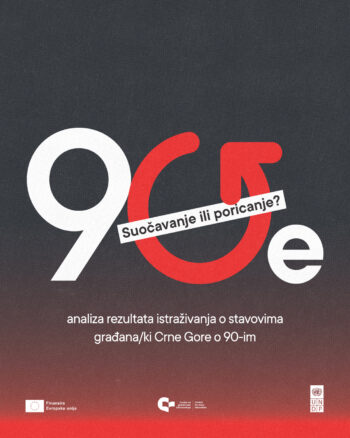The main sources of information about the 1990s are family, the media, and the immediate environment, while formal education, unfortunately, plays only a marginal role. Encouragingly, young people are more open to confronting the past and to changes in the educational approach, according to the findings of the Centre for Civic Education (CCE) publication “The Nineties – Confrontation or Denial?”, based on public opinion research from January 2025, with a comparative overview of data from 2020. and 2021 (covering the general population) and data from 2024 focused on youth aged 18 to 25.
The publication analyses citizens’ attitudes towards war crimes, accountability, education about that period, memorialisation, and the institutional approach to transitional justice. Its aim is to encourage an evidence-based public debate on transitional justice and to motivate decision-makers, as well as other social actors, to strengthen institutional capacities and improve the process of dealing with the past.

Visible trends reinforce social divisions, the political instrumentalisation of the past, and the lack of consensus on facts. Most believe that Montenegro has not sufficiently addressed war crimes institutionally, and there is concern that certain narratives of denial or relativisation of crimes enjoy significant public support.
A dominant (60%) believe that the 1990s are significant for today’s society, while the majority (54.7%) also think that the ideologies and policies that led to conflict and crimes are still present. Almost 72% acknowledge Montenegro’s participation in the wars, but less than half (49.7%) believe that war crimes occurred on its territory, despite final court rulings confirming this.
The data also point to deep public distrust in institutions when it comes to transitional justice – the prosecution, judiciary, police, Government, President, and Parliament are rated as the least committed, while the NGO sector and media, although only a small number deal with this topic, enjoy the highest trust. Religious and academic communities receive average ratings, and political parties are not recognised as drivers of this process. This trend threatens to leave dealing with the past at the level of partial and informal initiatives, deepening divisions and political instability, while also slowing down European integration, where transitional justice is one of the key criteria.
The 2025 findings indicate a strengthening of relativisation and selective remembrance. While agreement is decreasing on the idea that all sides are equally responsible or committed equally serious crimes, there is a growing rejection of the notion that one’s own nation committed the gravest crimes. Polarisation in the perception of suffering is increasing, and agreement is declining on the principle that individuals, not nations, bear responsibility. The CCE points out that these are signs of strengthening collective defence through the lens of national belonging, and a reduced willingness to critically examine one’s own community’s role in the conflicts.
A bright spot in that dark period were the anti-war movements and individuals who bravely resisted the war-mongering policies. Despite their efforts, Montenegrin society still shows signs of collective amnesia and a weak, superficial institutional response. The lack of broader political and societal will, the absence of comprehensive educational and memorial policies, and very limited progress in prosecuting war crimes have contributed to the fact that, more than three decades later, there is still no consensus on issues of fundamental civilisational importance.
In this context, the CCE recommends strengthening educational content about the wars of the 1990s in schools, with a focus on facts, accountability, and human rights. Public campaigns are also needed to promote a culture of remembrance and the condemnation of war crimes, as well as to encourage improvements in the legal framework and practices against hate speech and historical revisionism. The CCE also believes that greater involvement of young people is needed in intercultural exchange and memorialisation programmes, as well as support for alternative education and fact-documentation initiatives.
The authors of the publication are Ivana Matanović, Marlena Ivanović and Damir Suljević, with Zvezdana Kovač as editor.
The publication was published within the CCE project “Education for the Future – Transitional Justice for Reconciliation”, which is part of the regional programme EU Support to Confidence-Building in the Western Balkans, funded by the European Union (EU) and implemented by the United Nations Development Programme (UNDP). The content of this publication is the sole responsibility of the CCE and the authors and does not necessarily reflect the views of the EU or UNDP.
